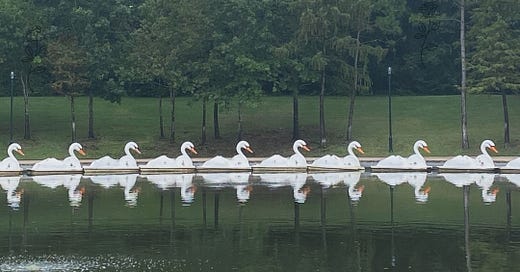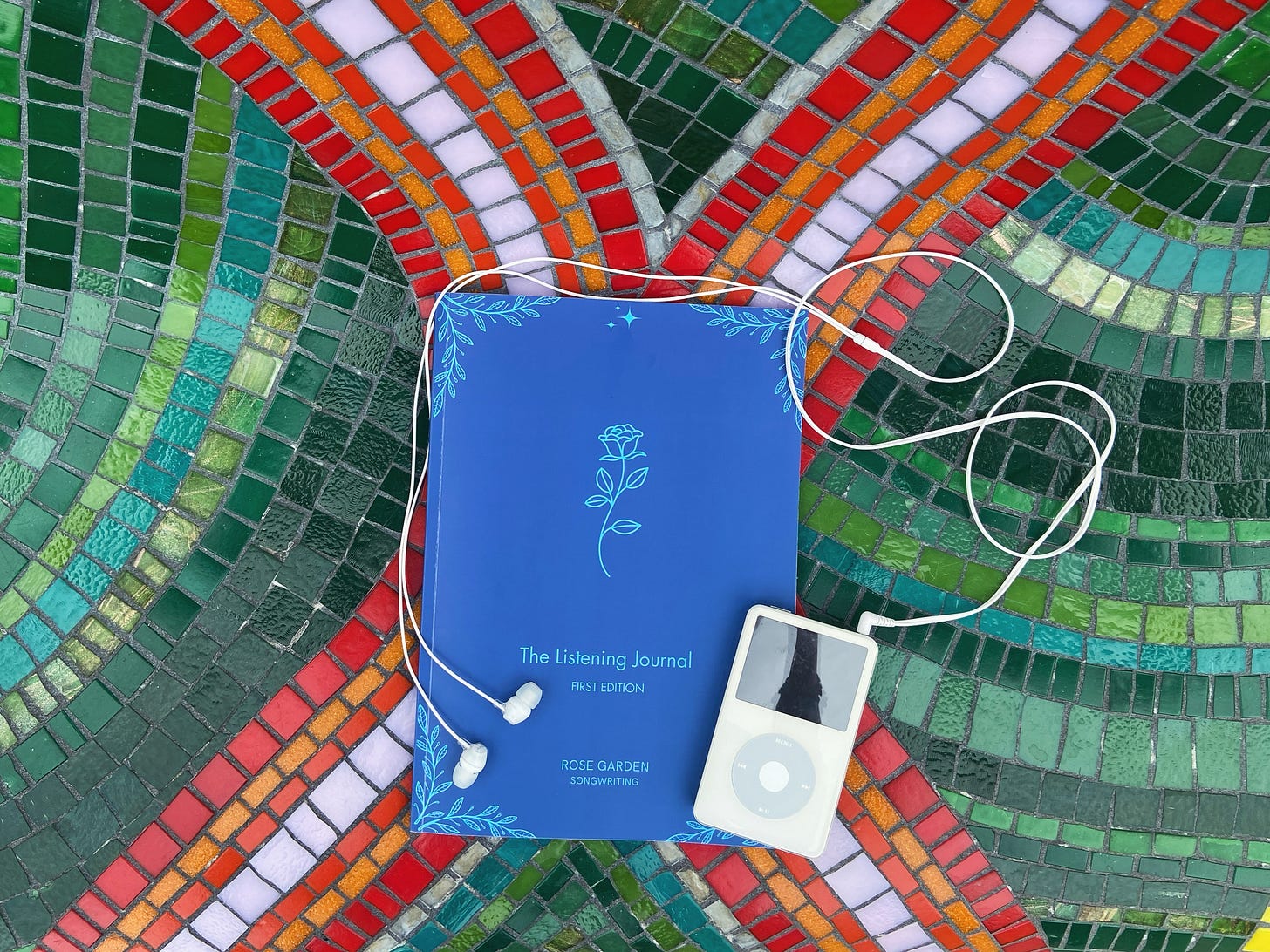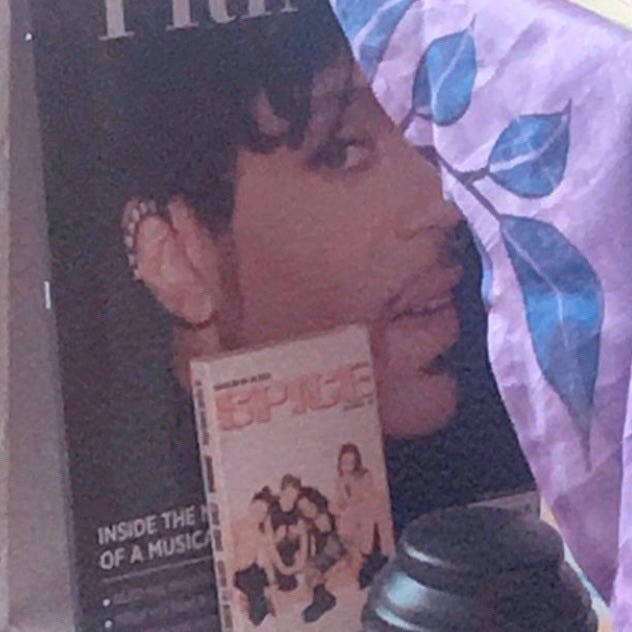I bought music for the first time as a little kid at Best Buy in 1996. It was a big deal. It was my first opportunity ever to choose music without my parents help and to explore beyond my parent's excellent music collection. I realized I couldn’t buy both the freshly popular Macarena or The Spice Girls on my allowance, so my mom pointed me in the direction of the bargain bin, and to my sheer joy, I found a Spice Girl’s cassette and The Macarena. A cassette tape was the singular way I could hear the songs I loved on the radio. We climbed into the car, excitedly opening the tapes, only to discover the Spice Girl’s tape was not the full album, but the single Wannabe with the B side Bumper to Bumper (the B side played first and was the telltale sign I bought the wrong cassette, which felt ridiculously devastating), and The Macarena was NOT the Macarena, it was the country version of The Macarena. We were so shocked by the surprise terrible Macarena, my mom and I started laughing until we cried. (see below)
But those cassette tapes became my tapes. I bought them, so I listened to them (and so did my siblings by proxy) (and mostly Wannabe’s A side)—but I listened to them to the point that I became more familiar with the absolutely awful bizarre country Macarena than the radio original. Thank God Napster revolutionized the music industry.
I still forget I have access to every recording uploaded to streaming services. EVERY RECORDING. And despite having access to an artist’s ENTIRE catalog, I notice I often stick with my playlists, my Apple Music’s “recently added” page (the squares are bigger, therefore, easier to press while driving), an artist’s top 10 most played songs, or my tried and true favorite albums I can easily remember on the spot — and I know I’m not alone. People stick with what they know. Exploring new music is scientifically stimulating and takes the listener outside their comfort zone. (And this article too on random album generators and neuroplasticity).
Every musician understands this: play songs the crowd knows and the crowd goes wild, premiere a new song to an audience without the appropriate setup and watch the buzz die.
“Listening to new music… can be overwhelming to our brain since it cannot rely on memory, a familiar map, to the same extent as with our favourite songs and playlists. But it is a perfect challenge for the frontal areas of the brain, which are activated when we are exposed to complex new patterns in our environment and try to understand them.”
https://musicpsychology.co.uk/thoughts-on-listening-to-new-music/
Now that we have unlimited access to an abundance of music, in a world where apps and devices are constantly competing for our attention, and with neural studies that show it is increasingly challenging for the brain to listen to new music as we age, how do we practice consciously introducing ourselves to new work and valuing the music we listen to?
Those were the questions I was thinking about when I designed The Listening Journal. I wanted a space where people could document what they were listening to with intention, the memories they were making, the feelings they were feeling, AND YES, the nerdy places my brain goes when I hear a song and start to break it down so I can better internalize and embody it.
HUMANS LIKE CONTAINERS. They make us feel safe, especially when venturing into the new. When the subject is too broad, like the creative process, we can feel stuck and struggle to take action. Containers give us a sense of orientation and direction, completion, and accomplishment. It helps us feel more focused and comfortable exploring something so vast.
Speaking of containers, Björk is a master of containers. You can listen to her speak on the specificity of each container she created for every album on her podcast.
What did I learn from listening to Björk for 12 weeks?
To be very honest, I felt like I stepped into something holy. For me, listening to music is a very sacred experience. Björk’s work is a kind of initiation. Even though I am already familiar with her music, to do a deep dive with fresh ears, especially into albums I hadn’t given much attention to, was a profound experience that is difficult to share, so I made a stream of conscious list I did not bother to capitalize or punctuate:
i picked every song intuitively, based on what felt exciting and curious to me, and every week, the song's lyrics were like premonition tea leaves and reflected psychological themes of my life back to me
NO ALGORITHMS — JUST CURIOSITY AND INTUITION
i mostly like to listen to björk’s music when i’m happy or when the world is happy, even her darker albums
i only felt like deviating from bjork’s music as “the song topic” in week 9, because it was one of those weeks on earth when the world was sad — but i still ended up listening to björk
if the album isn’t on my recently added or in a playlist, it doesn’t get listened to
compare and contrast between what was held still and what opposed it
compare and contrast with the new music and old familiar music = changes in my ear
compare and contrast between who björk is and who am i
arrangement choices bringing out arrangement choices
who we study and spend time with creates our musical family tree
summer memories like when an 80 foot tree fell on my bedroom and we had a power outage
it completely changed how i hear production. like, life changing-changed how i hear production. i don’t know how you could listen to björk and not hear arrangement and production differently.
how björk quotes herself in her music
when songs landed in my subconscious and i could hear the details from memory and when they didn’t
how complex is too complex?
viscerally feeling the energy each album’s era carries — is jeff buckley’s ghost haunting Post in his afterlife? is he?? IS HE???
it brought to life the songwriting intentions and goals i set at the beginning of the summer, for which i am very grateful
BJORK IS NOT AN ALIEN. BJORK IS THE MOST HUMAN.
You can read what I experienced, but if you really want to know about Björk, you could listen to her music and journal about it for 12 weeks and see what changes in you, rather than listen to what I think or learned. I don’t want to be the passive audience to anyone’s experience of Björk. I want my experience—which is the whole point of The Listening Journal. Stop looking to others tell you what to think, and live your unique experience and come up with your own ideas and interpretations!
It is a little bitter sweet and very satisfying to say, I finished my first copy of The Listening Journal! I am so grateful I have access to the extensive catalog of a genius and revolutionary female composer. I am excited to start the journal again, just not publicly blogging about it :)
The Listening Journal is currently an 82 page, 12 week journal for creative-freedom-seeking-curiosity-driven intentional deep listening and independent learning in songwriting and music composition. It is printed every May and June.







Awesome work!!